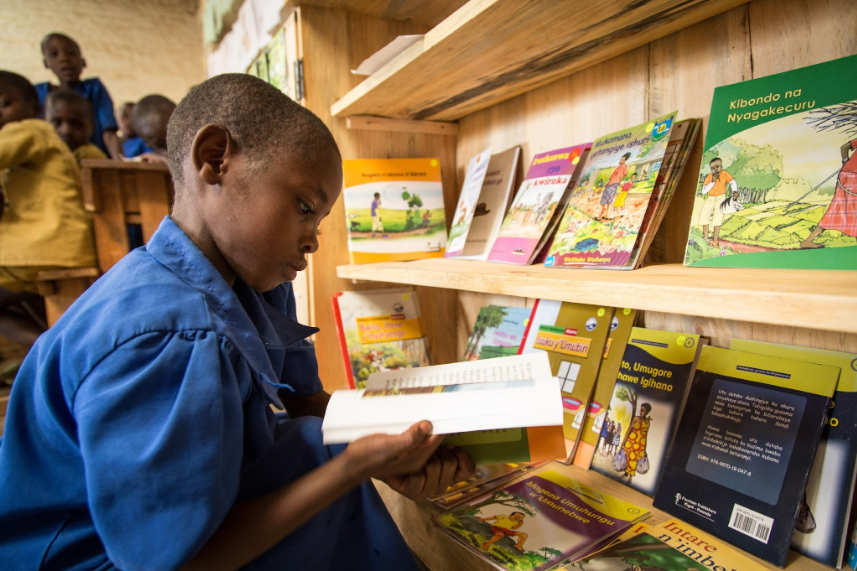Closing the literacy gaps for marginalized children in underserved languages
On this International Mother Tongue Day, which focuses on the importance of linguistic diversity for sustainable development, let us celebrate the rich tapestry of languages that make the world vibrant and diverse. Language goes beyond being the means of communication, it is a bridge to literacy and knowledge. It is widely known that using languages that learners use and understand at home in teaching and learning leads to better comprehension and vocabulary acquisition, thus contributing to increased academic performance and success, especially in early years and foundational learning. Languages transmit and preserve traditional knowledge and cultures, facilitating intergenerational learning and reducing the literacy gap.
UNESCO’s World Inequality Database on Education shows that, globally, children being taught in a language they speak at home are 30% more likely to read with understanding by the end of primary school than those who do not speak the language of instruction. Despite this evidence, it is estimated that 40% of the world’s population does not have access to an education in a language they speak or understand. This statistic is alarming as oral language is the cornerstone of reading and writing which serves as a defining factor for literacy development. According to a study conducted by the World Bank and UNESCO, inequitable and limited access to learning resources in one’s spoken language further contributes to widening inequality and global learning poverty.
The GBA envisions a world in which all children achieve literacy and have access to quality books in a language that they understand with which they can learn to read, read to learn, and develop a love of reading. The access, availability, and active use of teaching and learning materials in a language that children use and understand can have a compelling effect on learning outcomes and improve creativity and critical thinking skills, which are important for youth to succeed. Through its partnerships and initiatives, the GBA strives to increase the availability of quality children’s books in local languages and in print and digital formats, such as through the Global Digital Library and the Early Learning Resource Network.
Let us celebrate linguistic diversity and continue committing to providing equitable access to multilingual education to bridge the literacy gap!
You can find more about GBA initiatives and resources on bridging the literacy gap through enabling access to books in local languages here: https://www.globalbookalliance.org/
Learn more about GBA Steering Committee member UNESCO’s event to celebrate International Mother Tongue Day here. UNESCO’s celebration of International Mother Language Day 2024 will highlight the importance of implementing multilingual education policies and practices as a pillar to the achievement of Sustainable Development Goal 4 which calls for inclusive, quality education and lifelong learning for all as well as to the objectives of the International Decade on Indigenous Languages (2022 – 2032).
Related Resources to Learn More
Jolene Reed and Elizabeth L. Lee (2020). The Importance of Oral Language Development in Young Literacy Learners: Children Need to Be Seen and Heard. Accessed at: https://files.eric.ed.gov/fulltext/EJ1293447.pdf
Leighton, M (2022). Mother tongue reading materials as a bridge to literacy. Economics of Education Review. Available at: https://doi.org/10.1016/j.econedurev.2022.102312
UNESCO (2024). Concept note on International Mother Language Day 2024. Multilingual education: A pillar of intergenerational learning. https://articles.unesco.org/sites/default/files/medias/fichiers/2024/02/imld-2024-cn-en.pdf
UNICEF (2019). Early literacy and multilingual education in South Asia. https://www.unicef.org/rosa/media/3036/file/Early%20literacy%20and%20multilingual%20education%20in%20South%20Asia.pdf
World Bank Group and UNESCO (2022). The state of Global Learning Poverty: 2022 Update. https://www.worldbank.org/en/topic/education/publication/state-of-global-learning-poverty
World Bank Group (2023). LOUD AND CLEAR: Effective Language of Instruction Policies For Learning A World Bank Policy Approach Paper. https://documents1.worldbank.org/curated/en/517851626203470278/pdf/Effective-Language-of-Instruction-Policies-for-Learning.pdf

